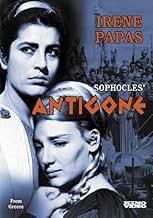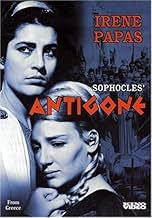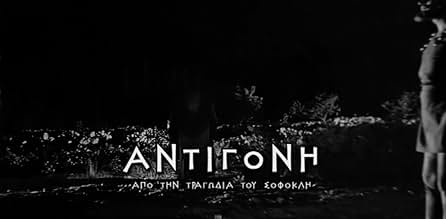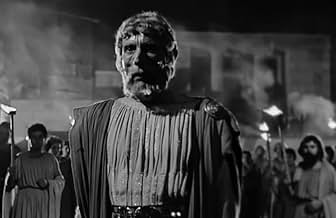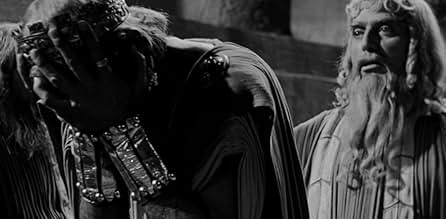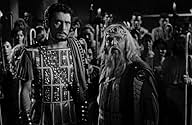Füge eine Handlung in deiner Sprache hinzuAntigone defies her uncle's decree that her traitorous brother should go unburied and therefore find no rest in the afterlife; however, her actions have tragic consequences.Antigone defies her uncle's decree that her traitorous brother should go unburied and therefore find no rest in the afterlife; however, her actions have tragic consequences.Antigone defies her uncle's decree that her traitorous brother should go unburied and therefore find no rest in the afterlife; however, her actions have tragic consequences.
- Regie
- Drehbuch
- Hauptbesetzung
- Auszeichnungen
- 3 Gewinne & 1 Nominierung insgesamt
Yorgos Karetas
- Elder of Thebes
- (as Giorgos Karetas)
Mimis Rougeris
- Elder of Thebes
- (as Dimitris Rougeris)
Empfohlene Bewertungen
Antigone represents the epitome of philosophical thought in antiquity. The ruler in Creon is set opposite to the loyal sister in Antigone. The ethical dilemma presented in the film is much like Plato's works: Euthyphro and Republic. Creon, as the ruler Thebes, thinks it just to not bury the fallen enemies near the city as it would disgrace the city. Antigone on the other hand feels it just to her fallen brother, a confederate to the previous regime, that he be given a proper burial in regard to his and Antigone's beliefs in the Gods.
The conflict gets its genesis from a varying view of what is just or the right thing to do. Take Plato's dialogue between Socrates and Euthyphro in Euthyphro. Euthyphro explains to Socrates that something pious (just, good) is something unanimously loved by the Gods. Socrates raises the question as to whether the gods love the pious because it is the pious or whether something pious is only pious because it is loved by the gods. The circular dilemma present by Euthyphro brings a question to Antigone. Is she right for wanting her brother buried and disrupting edicts by Creon's rule? Is her pious belief in the Gods something she ought to uphold? Does the good or justice in her brother's burial supersede Creon's rule? Additionally, in Plato's Republic Thraseymachus explains to Socrates that the just is the advantage of the stronger, and that it is just to obey one's rulers. Socrates argues against this conclusion but with weak premises. For Euthyphro, Antigone would be justified in wanting her brother buried in his religious fashion which would dictate his corpse not rotting in the woods. Thraseymachus on the other hand would say that the justice resides in the ruler, Creon, for better or worse. Which is right?
The conflict gets its genesis from a varying view of what is just or the right thing to do. Take Plato's dialogue between Socrates and Euthyphro in Euthyphro. Euthyphro explains to Socrates that something pious (just, good) is something unanimously loved by the Gods. Socrates raises the question as to whether the gods love the pious because it is the pious or whether something pious is only pious because it is loved by the gods. The circular dilemma present by Euthyphro brings a question to Antigone. Is she right for wanting her brother buried and disrupting edicts by Creon's rule? Is her pious belief in the Gods something she ought to uphold? Does the good or justice in her brother's burial supersede Creon's rule? Additionally, in Plato's Republic Thraseymachus explains to Socrates that the just is the advantage of the stronger, and that it is just to obey one's rulers. Socrates argues against this conclusion but with weak premises. For Euthyphro, Antigone would be justified in wanting her brother buried in his religious fashion which would dictate his corpse not rotting in the woods. Thraseymachus on the other hand would say that the justice resides in the ruler, Creon, for better or worse. Which is right?
Easy to define it as inspired adaptation of Sophocles play. The superb Antigone proposed by Irene Papas, Creod isolated in his convinctions and fears and presumed vulnerabilitz, well performed by Manos Katrakis , Maro Kodou as Ismene or Ilia Lyvikou as Euridyce are the good reasons to see it as exceptional adaptation.
But the basic reason remains the option of Giorgos Tzavellas to suggest a direct interogation to audience.
Gestures in name of justice.
Laws and attitudes.
Radical answers against injustice.
And falls.
Indeed, all known from the Old Greek or Philosophy classes , from lectures of early ages , from other adaptations.
But the strong virtue of Irene Papas to be one with her character , maybe the language itself , maybe the set are details giving to this Antigoni a profound special status . And this makes it real different.
But the basic reason remains the option of Giorgos Tzavellas to suggest a direct interogation to audience.
Gestures in name of justice.
Laws and attitudes.
Radical answers against injustice.
And falls.
Indeed, all known from the Old Greek or Philosophy classes , from lectures of early ages , from other adaptations.
But the strong virtue of Irene Papas to be one with her character , maybe the language itself , maybe the set are details giving to this Antigoni a profound special status . And this makes it real different.
In Thebes in ancient Greece, King Oedipus kills his father and marries his mother Jocasta, having two sons – Eteocles and Polyneices – and two daughters – Ismene and Antigone. King Oedipus dies a beggar in the exile after gouging out his own eye, and Eteocle agrees to reign in Thebes in alternating years with Polynices. However, he refuses to resign after the first year and Polynieces raises an army and attacks Thebes, and they kill each other.
The ruler of Thebes Creon (Manos Katrakis) decrees that Eleocles should have an honorable burial while the body of the traitor Polyneices should be left on the battlefield to be eaten by the jackals and vultures. However, Antigone (Irene Papas), who was betrothed to Creon's surviving son Haemon (Nikos Kazis), defies Creon's orders and buries her brother. When Creon is reported of the attitude of Antigone, he sentences her to be placed in a tomb alive. Antigone hangs herself in the tomb and Haemon tries to kill his father first and then he kills himself with his sword. When Creon's wife Eurydice (Ilia Livykou) is informed of the death of her son, she also commits suicide, leaving Creon alone.
The theatrical "Antigoni" is a nice feature about the famous Greek tragedy of Sophocles focused in Antigone, the incestuous daughter of Oedipus and therefore also his half-sister and Jocasta's granddaughter. The movie begins with an important big picture of Thebes and the major characters of that period, and is extremely well acted. This is the first time that I watch this movie and I saw it in an American VHS. I only regret the quality of the subtitles that are visibly too much summarized since there are long speeches of characters that are translated in two or three words in English. My vote is eight.
Title (Brazil): Not Available
The ruler of Thebes Creon (Manos Katrakis) decrees that Eleocles should have an honorable burial while the body of the traitor Polyneices should be left on the battlefield to be eaten by the jackals and vultures. However, Antigone (Irene Papas), who was betrothed to Creon's surviving son Haemon (Nikos Kazis), defies Creon's orders and buries her brother. When Creon is reported of the attitude of Antigone, he sentences her to be placed in a tomb alive. Antigone hangs herself in the tomb and Haemon tries to kill his father first and then he kills himself with his sword. When Creon's wife Eurydice (Ilia Livykou) is informed of the death of her son, she also commits suicide, leaving Creon alone.
The theatrical "Antigoni" is a nice feature about the famous Greek tragedy of Sophocles focused in Antigone, the incestuous daughter of Oedipus and therefore also his half-sister and Jocasta's granddaughter. The movie begins with an important big picture of Thebes and the major characters of that period, and is extremely well acted. This is the first time that I watch this movie and I saw it in an American VHS. I only regret the quality of the subtitles that are visibly too much summarized since there are long speeches of characters that are translated in two or three words in English. My vote is eight.
Title (Brazil): Not Available
Antigone, written by Sophocles, is a characteristic Greek tragedy where the city's king, Creon, is faced with a moral dilemma that eventually hastens his fall from grace. Set in antiquity, the movie's plot is designed to question presupposed ideas of justice and wisdom as they were seen through the ancient Greek perspective.
In the movie, the protagonist, Antigone, is faced with a moral dilemma after her king, Creon, orders that her brother should be left unburied (a terrible punishment in ancient Greek culture since it would prevent his passage through the river Styx). Eventually, Despite the king's decree, Antigone decided that her brother's death with-out burial was unjust and challenged Creon's authority to prevent his burial by performing the ritual herself. After the discovery of her crime, Creon sentences Antigone to death – an act that created a great deal of unpopularity in the kingdom and incited lines of questioning very similar to contemporary Socratic arguments.
Creon's decision to sentence Antigone to death and her brother to a hellish afterlife were seen as unjust and despotic by the people of Thebes and caused his wisdom/authority to be questioned. Since ancient Greeks believed that the Sovereign set the morality of their city state, the act of questioning alone represents Socratic argument. Sophocles sets up questioning, in a manner very similar to Socratic arguments made through Euthyphro and Apology, by using Creon's own son and oracle to test Creon's judgment in an attempt to show that just being a king does not make someone wise or knowledgeable of justice.
The morality of Antigone eventually surfaces after Creon's fall from grace. At the end of the movie, Creon finally sees the error of his ways but Sophocles uses his downfall to express how even king's judgment can be governed through hubris instead of actual wisdom.
In the movie, the protagonist, Antigone, is faced with a moral dilemma after her king, Creon, orders that her brother should be left unburied (a terrible punishment in ancient Greek culture since it would prevent his passage through the river Styx). Eventually, Despite the king's decree, Antigone decided that her brother's death with-out burial was unjust and challenged Creon's authority to prevent his burial by performing the ritual herself. After the discovery of her crime, Creon sentences Antigone to death – an act that created a great deal of unpopularity in the kingdom and incited lines of questioning very similar to contemporary Socratic arguments.
Creon's decision to sentence Antigone to death and her brother to a hellish afterlife were seen as unjust and despotic by the people of Thebes and caused his wisdom/authority to be questioned. Since ancient Greeks believed that the Sovereign set the morality of their city state, the act of questioning alone represents Socratic argument. Sophocles sets up questioning, in a manner very similar to Socratic arguments made through Euthyphro and Apology, by using Creon's own son and oracle to test Creon's judgment in an attempt to show that just being a king does not make someone wise or knowledgeable of justice.
The morality of Antigone eventually surfaces after Creon's fall from grace. At the end of the movie, Creon finally sees the error of his ways but Sophocles uses his downfall to express how even king's judgment can be governed through hubris instead of actual wisdom.
Most people who watch this film will be doing it in order to see an example of a classic Greek tragedy. They will be satisfied. It is dignified, stately, and absolutely dripping with fate, destiny, and tragedy.
But what if you are more like an average movie-goer? Does it hold up under more normal criteria? I think it does to some extent, but not particularly well. The plot is started at the very beginning of the opening scene as Antigone expresses her determination to bury her dead brother, and everything else follows inevitably - the entire story is plot-driven. It's a rather simple plot, but it does carry you along. I'm not sure there's a lot more that's really compelling about the film. It's pretty stagey, with actors and extras forming nice patterns, as if lining up with chalk lines on the floor. Although there are a number of small processions and such, this is not a costume epic with a cast of thousands and crane shots filling the screen with colourful eye candy. It's filmed in black and white. Is the acting good? Sure, but bear in mind that the range of emotions is quite limited, and characters pretty much talk in set speeches. They do imbue their dignified speeches with the correct emotions and make them sound sincere.
But, to be honest, I don't think you would recommend this film to anyone unless they had a pre-existing interest in classical Greek drama.
But what if you are more like an average movie-goer? Does it hold up under more normal criteria? I think it does to some extent, but not particularly well. The plot is started at the very beginning of the opening scene as Antigone expresses her determination to bury her dead brother, and everything else follows inevitably - the entire story is plot-driven. It's a rather simple plot, but it does carry you along. I'm not sure there's a lot more that's really compelling about the film. It's pretty stagey, with actors and extras forming nice patterns, as if lining up with chalk lines on the floor. Although there are a number of small processions and such, this is not a costume epic with a cast of thousands and crane shots filling the screen with colourful eye candy. It's filmed in black and white. Is the acting good? Sure, but bear in mind that the range of emotions is quite limited, and characters pretty much talk in set speeches. They do imbue their dignified speeches with the correct emotions and make them sound sincere.
But, to be honest, I don't think you would recommend this film to anyone unless they had a pre-existing interest in classical Greek drama.
Wusstest du schon
- WissenswertesThe movie sold 43,705 tickets. It came in 12th out of 68 movies.
- VerbindungenReferenced in Dinos Katsouridis: Mia zoi san sinema (2012)
Top-Auswahl
Melde dich zum Bewerten an und greife auf die Watchlist für personalisierte Empfehlungen zu.
- How long is Antigone?Powered by Alexa
Details
- Erscheinungsdatum
- Herkunftsland
- Sprache
- Auch bekannt als
- Antigone: A Tragedy by Sophocles
- Drehorte
- Produktionsfirma
- Weitere beteiligte Unternehmen bei IMDbPro anzeigen
- Laufzeit1 Stunde 33 Minuten
- Farbe
- Sound-Mix
- Seitenverhältnis
- 1.37 : 1
Zu dieser Seite beitragen
Bearbeitung vorschlagen oder fehlenden Inhalt hinzufügen


